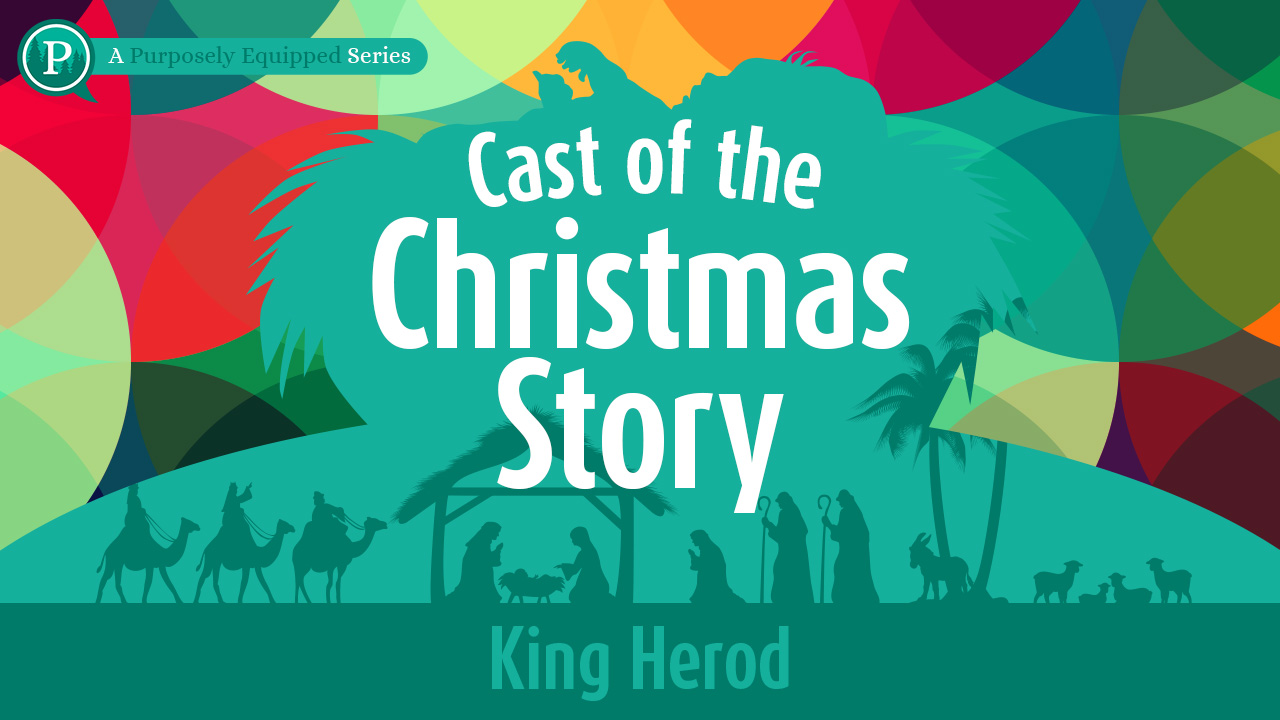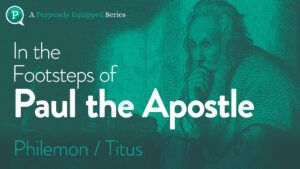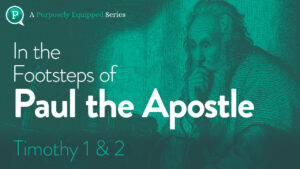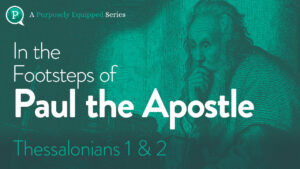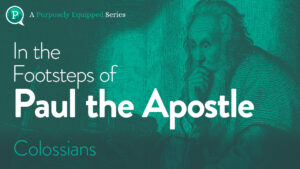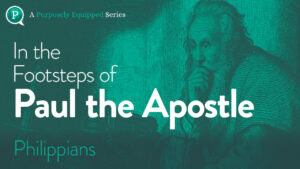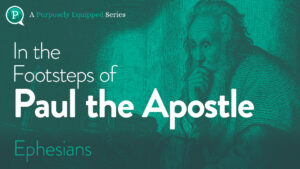Jen Ervig from The Grove Church joins Mark today to discuss Herod the Great. Herod, a non-Jewish king appointed by the Romans, was known for his paranoia and fear of losing his throne. When he heard about the birth of Jesus, he saw it as a threat to his power and ordered the killing of all male infants in Bethlehem. Despite his negative reputation, Herod was also known for his architectural achievements and attempts to win the love of his subjects. His role helps to emphasize the importance of placing one’s identity in Christ and not clinging to earthly power or status.
Special thanks to World Concern Global Gift Guide, for bringing us the Cast of the Christmas Story!
Show Notes:
- World Concern Global Gift Guide
- Looking for a church in the Marysville area? Check out The Grove Church in Marysville
Transcription:
Mark Holland:
The Cast of the Christmas Story series is sponsored by World Concern and the Global Gift Guide. Find out more at globalgiftguide.org.
Intro:
The cast of the Christmas story.
Mark Holland:
As we continue with The Cast of the Christmas Story, different pastors have come in, and again, before we were recording this, I guess these ladies don’t want to be called pastors.
Jen Ervig:
It’s fine.
Mark Holland:
We’ll get to know another one here in a moment, but right now we’re talking with Jen Ervig. Jen, hi.
Jen Ervig:
Well, hello. Thanks for having me.
Mark Holland:
And what is your role there at the Grove Church in Marysville?
Jen Ervig:
Such a fun question. I am the Connections Pastor, and so what that basically means is I connect you. I connect you to serving, to life groups, to resources, whatever you need, I’m your girl.
Mark Holland:
Okay. The connections, so the connect card comes from you, what we see at church?
Jen Ervig:
Yes, yes. The gifts you get and the little cards you get in the mail too. It’s all me. Yeah.
Mark Holland:
Okay. That can-
Jen Ervig:
Which is good because my love language is gifts.
Mark Holland:
Well, there you go. My wife’s too.
Jen Ervig:
Good.
Mark Holland:
She’s always working on cards and sending out care packages and all. I said, “Jennie, does anybody even care about this?” But I guess she gets a great-
Jen Ervig:
Did you just say her name is Jennie?
Mark Holland:
Jenny, yeah.
Jen Ervig:
I love it. I like her already.
Mark Holland:
But you’re Jen.
Jen Ervig:
Yes.
Mark Holland:
Is it always Jen or do you go by Jennie as well?
Jen Ervig:
Very few people call me Jennie and even-
Mark Holland:
With a Y or an I-E?
Jen Ervig:
An I actually. J-E-N-I.
Mark Holland:
Just an I.
Jen Ervig:
So just take off the fur.
Mark Holland:
Jennie’s an an IE and she hates it when people read her name and call her Jeanie. That’s her main pet peeve.
Jen Ervig:
Oh, yes. That would be annoying.
Mark Holland:
She can’t handle that. So anyway, connections person there at the Grove Church in Marysville. And you got the assignment, although you said you have volunteered for this subject. Who are we talking about today?
Jen Ervig:
We are going to talk about Herod the Great.
Mark Holland:
Herod the Great. So many Herods in Christmas… There’s only one in the Christmas story, but lots in Jesus’ life, 33 year life.
Jen Ervig:
Yes. And they are all related.
Mark Holland:
Okay.
Jen Ervig:
Yeah, they all start with Herod the Great, and none of them are fun people. That’s why you never see people naming their babies after Herod. We don’t want that reputation in the family. But yeah, I think it was Herod Antipas that beheaded John, and Agrippa II dealt with Paul, so you see them later in the New Testament. But yeah, we’re going to deal with Herod the Great today.
Mark Holland:
Okay. Well, tell us a little bit about who was this particular Herod, Herod the Great?
Jen Ervig:
Okay, so Herod, he was actually an Idumite.
Mark Holland:
An Idumite?
Jen Ervig:
I think the other term is Idumaean, am I saying that right? Yeah. And so what that means is that he was not Jewish, and he was appointed King of the Jews by the Romans, and so the Jews, not a fan.
Mark Holland:
Not a fan, put it mildly.
Jen Ervig:
Not a fan at all, and even, he did great things, I mean there-
Mark Holland:
Quite a builder.
Jen Ervig:
No, quite a builder. And he actually too, he would go out of his way to care for the people that did not love him, so when the poor were facing hunger and stuff like that, he would feed them and take care of them. He was always trying to win their love. Never ever really did, for obvious other reasons that I’m sure we’ll get into.
Mark Holland:
And he reigned a long time too, right?
Jen Ervig:
37 years.
Mark Holland:
Wow. 37 years.
Jen Ervig:
I want to say he died 4BCE. Year 4, before Christian era is when he died. They say that’s about a year after he learned about Jesus.
Mark Holland:
So about a year after Jesus, now he’s the paranoid king who received the Magi and different people who said, “Hey, there’s someone born king of the Jews,” and that really set him off.
Jen Ervig:
That did really set him off. All of Herod’s life, what you want to understand about Herod, is he fought for his position. He fought to be loved, he fought to just have his place in the world, and so he’s made king of the Jews by Romans. Jews don’t like the Romans. He’s not Jewish, although actually his family became Jewish. His father practiced Judaism, and so he was Jewish to an extent. And he even married out of his 10 wives… Guy had 10 wives.
Mark Holland:
Wow. All at the same time, like a harem or something?
Jen Ervig:
Yeah. Well, he did it for political reasons. The guy was just genius politically in his alliances and how he would, I mean, honestly, scheme and maneuver. But his favorite wife was called Mariamne and she was Hasmonean, so she was Jewish, and that was his, he thought and hoped would be his claim to the throne with the Jewish people, but it was still a no-go in their hearts. But he loved her. She was his favorite wife, even though, well, he did kill her too.
Mark Holland:
Oh boy, so he was quite a piece of work.
Jen Ervig:
He was a piece of work, yes.
Mark Holland:
Well, tell us a little bit about it where he comes into The Cast of the Christmas Story, so he is the man who was in charge when Jesus was being born or was coming into the world. How did this happen?
Jen Ervig:
So let’s set the stage a little bit. So when Herod learns about Jesus, he’s already towards the end of his life and his reign. He is wrought with several physical ailments, sores, writhing pain. It was even said that he had worms on his body.
Mark Holland:
Oh boy.
Jen Ervig:
And this paired with his paranoia and having to fight for his throne and his place in life his whole life. It just drove him mad. At this point, when he learns about Jesus, his two favorite sons he’s killed. He’s killed his favorite wife, Mariamne, all because he thought they were going to take his throne from him. And so this is a man who is clutching for power. So when the Magi show up and they’re like, “Hey, we’re here to see the one who’s named born King of the Jews,” immediately, Herod’s no dummy, he goes into immediate political mode.
What’s he going to do? How’s he going to be savvy? How’s going to maneuver those chess pieces? What is he going to do? And so he’s like, “Oh, okay. King of the Jews. Great. Why don’t you go figure out where he is? We’ll even ask my guys if they know where he is. Bethlehem, great. Why don’t you go see him and then tell me if you find him and then come back to me and let me know. I want to worship him too.” But it’s all a game with Herod because he knows from the start that this is a threat to his throne, and this Jesus dude, this Jesus baby, he’s going to have to die.
Mark Holland:
And he tried to do that. He tried to kill Jesus. He had all the children killed up to two years of age.
Jen Ervig:
Yes and you know what I just recently learned? I don’t know if it’s true or not, but there are some studies who say that it was only about 20 babies who died because Bethlehem was such a small and quaint town. And I was like, “Huh. Never heard that one before.”
Mark Holland:
Oh, so he just had the babies killed in Bethlehem, not all of Jerusalem?
Jen Ervig:
That’s what one study says, but I don’t know whether to believe that or not, but I always like to just pull in the other perspective so that we can all come to our own conclusions and our own studying and stuff that we do. But either way, that is really hard. All those little boys, two years and under, and he killed just because he was afraid someone was going to take his place in life, take his throne.
Mark Holland:
Well that probably didn’t earn him any points with the Jewish population either by doing something, that was probably the final nail in the coffin for him.
Jen Ervig:
Oh yeah. But what we’ve learned from that, what I love about that is, all of us who try to grasp at power, that’s what happens is we leave a lot of collateral damage in our wakes. It’s all because we don’t want to give Jesus’ proper and rightful place on the throne.
Mark Holland:
Well, that’s obviously how we can apply the Herod aspect in our own Christian walk. So did Herod understand his part in the Christmas story, so to speak, you think?
Jen Ervig:
I don’t think he did. All Herod ever understood is survival mode. He understood that people did not like the places that he’d been placed in life. Well, except for the Romans, they adored him. He understood that people were always trying to get the truer king or the better king in his place, and so Herod understands self-preservation. You don’t hear about it a lot, but he actually did truly love his family. His father, Antipater who died, his brother who died, his children and wives whom he killed, he actually loved them, but if there was ever a threat to Herod’s place in this world, then the paranoia would kick in and he would take care of them.
Mark Holland:
Wasn’t there a prophecy about this, particularly the killing of the young? Wasn’t there a prophecy that put him in there, and that’s another way he was in the story. He didn’t realize that it was him.
Jen Ervig:
Yeah, even in Matthew 2:16 through 18 refers back to that prophecy in Jeremiah that talks about Herod’s part in the story, not Herod precisely, but the weeping of the children. Killing those 2-year-old babies and under, it talks about that, and so Herod’s place, not just in the Christmas story, but even in just the history of Jesus and what we see in the New Testament, I mean, it was the temple that he built. We talked about what a-
Mark Holland:
That’s still there today. Part of it.
Jen Ervig:
… what a fantastic architect he was. His architecture and brain and construction was even, it was up to modern times what we have now. It was just unheard of what he was like back then. But the temple that he built is the one that Jesus and Paul visited, or the funds that he raised to build all the buildings that he did, Caesarea, all these things in the cities, he taxed those Jewish people heavily. And that’s why you see in the New Testament that tax collectors are so hated. It all starts with Herod the Great. It comes back to that.
Mark Holland:
Herod the Great.
Jen Ervig:
Yeah.
Mark Holland:
Definitely a villain, but in some ways, in some of your notes you gave me, there are good things about him and bad, obviously more bad, but he was God’s instrument at this time. I think he’s the first historical person mentioned in the Christmas story.
Jen Ervig:
Yes, he is the very first one mentioned. It says in the time of Herod the Great, and you can read that even in the historian Josephus’s works that he’s done, and then Herod’s not mentioned again until the Magi enter.
Mark Holland:
Any other things of note about Herod or maybe how it applies to our life?
Jen Ervig:
I think what we learned from Herod is that, even in a beautiful time, like the Christmas story, birth of Jesus, all these wonderful things, beginning of our redemption story, all of that, is there’s a dark side. And none of us are a stranger to that dark side. There’s all of us that have a part of that, like Eve in the garden, clutching for… She wanted that fruit. She wasn’t just happy with just being the Queen of Eden. She wanted to be like God, and so she grasps for that. And that’s what Herod is doing. He’s grasping for that throne. He was given that throne. He fought to hold onto it. He worked for it his whole life, and Jesus is going to come take it?
But we all have that part in us. Just like I might be afraid that God’s going to have me step down from being a pastor someday, or my kids are going to, I don’t know, I am a boy mom. So I’m like, “What if they marry girls who don’t like me?” But all these things that dethrone us from the important things in our heart, those identities we have, and that’s why it’s important for us to make our identity in Christ and realize too that when we do that, he takes his proper place on the throne. And anything we have, we hold open handedly and just steward that well for his purposes.
Mark Holland:
Amen. Some of the heart of Jen Ervig, she’s the Connections Pastor at the Grove Church in Marysville, and we’ve been looking at Herod the Great, part of the Christmas story. For people listening to this podcast, Jen, maybe they’re going through a time, maybe at work or in some relationship where they’re feeling threatened or paranoid about their position. Pray for those people who are listening today and how they can turn their life more fully over to Jesus.
Jen Ervig:
Yes, of course. Lord, thank you for being with us today. Thank you for the Christmas story. Thank you for your redemption plan, Lord God. I pray that any of us, when fear creeps in and we worry about if we’re loved or if we belong where we’ve been placed in life, whatever that is Oh God, I pray that fear would not take our focus off you. That we would always, always be placing you on the throne of our hearts to our God and have joy in that, have peace in that, have great expectation in that Lord God. Be that peace for us in Christmas and always in Jesus’ name. Amen.
Mark Holland:
Amen.
The cast of the Christmas story series is sponsored by World Concern. You can give a gift with a lifetime of impact. Your gift will meet the critical need of a child or family living in poverty. You can give a goat or one of 43 other life-changing gifts today, through the world concerned global gift guide. Give life-changing gifts that work together to transform the lives of moms, dads and children in the world’s poorest places. You can even select a meaningful gift in honor of a friend or loved one. Each gift transforms the life of someone in poverty. Go to globalgiftguide.org. Again, that’s globalgiftguide.org.
Thank you so much for joining us for The Cast of the Christmas Story, a series on Purposely Equipped. We’d love for you to take a moment and let us know what you think of this series by leaving us a review. For more podcasts to grow your faith, we invite you to visit onpurposely.com. Until next time.
Follow this podcast:

